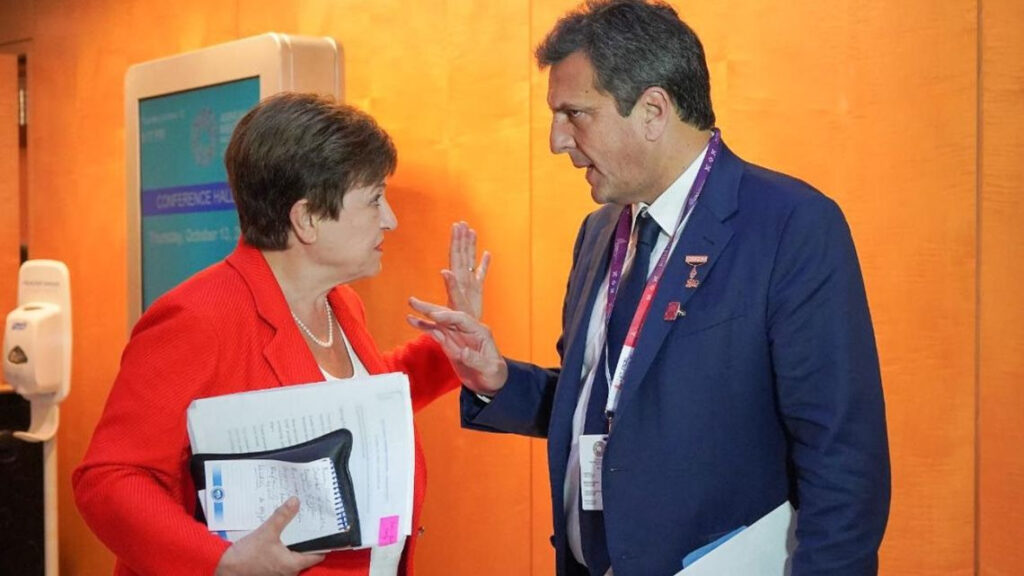Argentina’s Economy Minister Sergio Massa plans to open talks with the International Monetary Fund over US$12 billion in maturities due in the next six months if he is elected as the country’s next president in the November 19 run-off.
Despite paying the Fund US$2.6 billion in maturities this week, Argentina owes US$12 billion in due payments between the last two months of the year and April 2024.
With Central Bank reserves at a historic low, that is a severe obstacle for the leader of the next government. With foreign currency income only trickling in until the agricultural harvest, Massa believes Argentina will need to relieve some of the obligations that lie ahead in the next few months to avoid further foreign exchange tensions.
Argentina paid a series of maturities to the IMF on October 31 totalling US$2.59 billion, cancelling all pending obligations with the body until October. In addition, next Monday, the government must face an additional payment of US$830 million by way of interest.
As a result, the Central Bank’s gross reserves now stands at just US$21.861 billion, the lowest level in nearly 18 years. Experts believe the net level is much lower, perhaps even in negative.
Broker Portfolio Personal Inversiones (PPI) said in a report this week that, given that Argentina’s stock of IMF Special Drawing Rights (SDRs) was only US$1.847 billion, the govenrment likely used US$743 million worth of yuan from the second extension of its currency swap with China to complete the payment.
In the final two months of the year, Argentina faces commitments in foreign currency totalling US$2.46 billion, including principal and interest, out of which US$1.6 billion are owed to the IMF, while the remaining US$860 million is owed to other bodies.
Those operations could be cancelled with the remaining yuan from the second section of the swap, so that the Central Bank does not have to use its scant reserves at least until the end of the year.
IMF talks
In parallel, Massa’s deputy, Economic Policy Secretary Gabriel Rubinsteinm and his chief advisor Leonardo Madcur have already began talks with IMF technical staff on the seventh review of Argentina’s US£44.5-billion debt programme.
The country should receive a disbursement of US$3.25 billion by the end of the year, depending on the outcome of this review. IThe outlook is not very encouraging – Argentina missed targets on the fiscal deficit, accumulation of reserves and money-printing in the last review and there are serious complications in meeting the December targets.
Massa will hope a win in the run-off against La Libertad Avanza candidate Javier Milei will consolidate and strengthen his position in talks with the multilateral lender.
In order to obtain a previous disbursement of US$7.5 billion in August, the economy minister had to devalue the currency by more than 18 percent the Monday after the PASO primaries. This prompted inflation to soar into two digits and it is now at its highest level in three decades.
According to the calculations from the research centre of the Equilibra consultancy firm, the remaining US$3.5 billion Argentina can access in yuan from its currency swap with China will not be enough to face January foreign currency commitments, which amount to US$5.562 billion. However, the IMF maturities could be cancelled or delayed.
Argentina owes the IMF US$1.945 billion, and the private bondholders (Bonares and Globales) should be paid a further US$1.579 billion in the first month of 2024. In February, obligations amount to US$851 million, in March US$791 million and US$2.257 billion in April. That’s US$9.461 billion in just the first four months of 2024.
“A potential Massa government would have some oxygen with the activation of the second section of the swap (we do not believe it will be activated/used if Milei wins), but he should close a new deal with the IMF in summer to avoid any delays,” Equilibra wrote in its report.
If Massa wins in November, the expectation is he will seek to bridge the foreign exchange gap. Within the Economy Ministry, sources say they want to seek a new IMF disbursement as soon as the electoral race is over.
For 2024, the Unión por la Patria presidential candidate aspires to an energy surplus, greater foreign currency income from the agricultural sector, fewer fuel imports and wants to condition further IMF repayments to the level of exports.
For the time being, the international credit body has not contemplated such a scheme within Argentina’s multi-billion-dollar programme.
Source : BuenosAiresTimes

